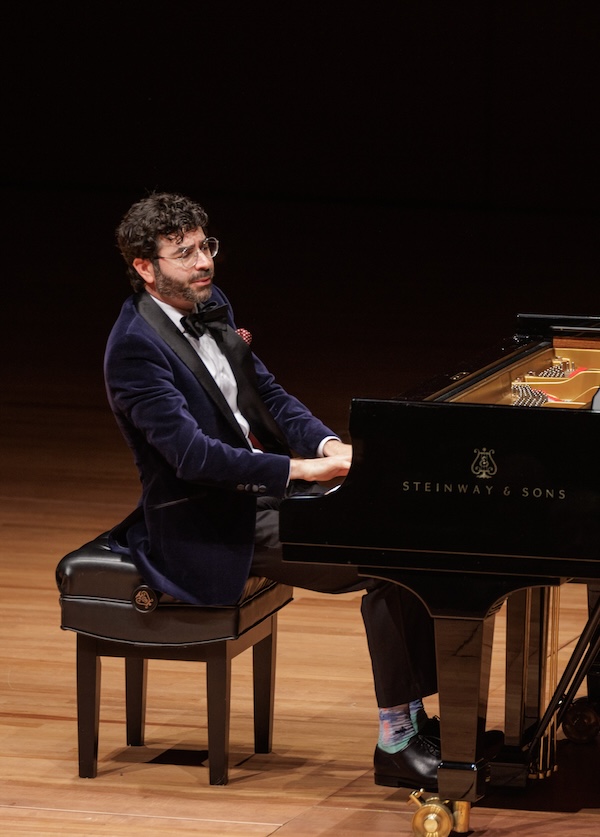Pianist Brown brings customary excellence, insight to a personal program for CMSLC

A solo concert is chamber music of a kind. The term almost always applies to a small group of musicians not just playing together but playing music that is built on internal communication.
But the scope of what’s on stage with a solo performer also fits the bill. And when the results are as fine as what pianist Michael Stephen Brown delivered for the Chamber Music Society of Lincoln Center in Alice Tully Hall Tuesday night, who’s complaining?
Brown is a frequent keyboard participant in CMS concerts, part of a fine duo with cellist Nicholas Canellakis, and a composer. The concert, billed as “An Evening with Michael Stephen Brown,” showed off some of his composing, but was primarily a vehicle for his taste, which is both interesting and quirky, and his pianism, which is considerable.
Brown broke the program into two unrelated themes, separated by an intermission. The first part was based around an abstract, structural idea, the second a narrative, textual one. With the given that Brown’s playing was excellent all evening, the relative success of each half came down to his thinking.
The foundation of the opening half was Haydn, his Fantasia in C Major, Capriccio, and pieces by Debussy, Ravel, and Brown built on the musical spelling of his name. The first statement of the main theme in the Fantasia showed that Brown had both a quick mind and quick hands, though they were in an ongoing debate over the proper tempo and articulation. There’s a slow breadth in the music before the theme returns, and Brown found his coordination there, going on to play with a clear touch that was both light and had great presence.
The wit and sense of pleasure in the music came through, not only in his playing but with his funny and self-deprecating introductions to the audience. Brown’s manner was ideal for Debussy’s Hommage à Haydn and Ravel’s Menuet sur le nom d’Haydn. Precise articulation in fluid phrasing, a sense of forward motion, and just the right amount of time lingering on the most colorful sonorities, all served the intellect and charm in the music.
Ravel’s Menuet might be the most beautiful piece he ever wrote, and Brown gave just the right amount of space to the marvelous cadences, letting the beauty blossom fully without any sense of indulgence. His playing was exceptional, natural and immaculate.
Brown’s own Etude-Fantasy on the Name of Haydn held its own, not as impressionistic as the French music but with bright harmonies and springy angles. He finished the first half with a fantastic performance of Miroirs. Playing fleetly but with every note presented precisely, his pedaling and balance between percussive and legato articulations were perfect; one was enveloped in the sheer sound and mysteries of this wonderful piece. “Une barque sur l’océan” was deeply evocative, and “Alborada del gracioso” brought many to their feet in a premature ovation. Brown recaptured the atmosphere of the performance with a mesmerizing “La vallée des cloches.”
The theme on the second half was love, both broken and requited. Rather than music that let the listener find their own meaning, the pieces needed to convince one they were about, or, at least, felt like, love.
One issue was that some of the music just wasn’t that good. Brown played selected Songs without Words by Delphine von Schauroth because the young Mendelssohn was enamored of her. But the music was simply not interesting— student level exercises in early, lyrical romanticism with no personality and little that was unique harmonically or thematically.
In contrast, Mendelssohn’s concise, lovely Fantasie in F-sharp minor was full of character—the kind of unexpected touches of color and turns of melody and harmony that not only make for personal style, but show a composer’s skill. Brown wrote about his love for Mendelssohn in the program notes, and made this clear through the transparent focus on the music. As with Ravel, he gave voice to the depths of expression without manner, and the music felt like it was about much more than love.
Brown introduced his own Breakup Etude for the Right Hand Alone as something he wrote when he was dealing with a left-hand injury, and said, “I made it masochistically difficult and I regret that now.” With his technique, the hyperactive shifts from runs up and down the keyboard and knotty little chromatic figurations—not to mention verbal interjection—didn’t sound all that difficult, but neither did they make for anything particularly enjoyable for the listener.
Things were back in form with the brief medley of arrangements from Mendelssohn’s A Midsummer Night’s Dream: Rachmaninoff’s “Scherzo” and Liszt’s “Wedding March and Dance of the Fairies.” Call it love music, or just extroverted, buoyant music, but the material is superb and Brown’s playing was equally so. His playing of the virtuosic Liszt transcription was the kind of technical performance that scintillates as a pure demonstration, with tremendously musical phrasing, all carried with a sense of great pleasure and expressive depth.
Brown’s encore was the perfect thing to bring everything back down to earth—Edward MacDowell’s “To a Wild Rose,” which was simple, unsentimental, and lovely.
The Orion String Quartet plays their farewell concert 7:30 p.m. April 2. chambermusicsociety.org